Featured Articles
After Almost Drowning and Being Eaten By Sharks, Punches Are No Big Deal
November of 2007.
What number attempt was this? 15? 17? Hard to recall.
The aim was to leave a place where the concept of liberty was merely a notion, something to be culled from the bootleg movies, or the stories of the people who’d gotten a taste, or known those who had.
Cuba, not the right place for an athlete with a superior skill set, one which included a desire to stand out, to separate from the pack.
The route, from Cuba to Florida, over water, under darkness, by the grace of God. He was busy this night, Rances Barthelemy guesses.
His grace was being applied elsewhere.
There was a capsize. Rances hit his head. Blacked out. Another boat, going the same route, filled with other souls desiring a homeland where competition is to be admired and rewarded commensurate, ideally, with their accomplishments, went by, and saw the floaters, the rubble in the water. Rances got scooped up. Some guy pounded on his chest, some heavy duty body work.
Water spurted out of his mouth, like you’d see on bootlegged Looney Tunes. Timing was good, or soon, Rances tells me, the sharks might have found their midnight snack in him.
Give up? Not an option; there’s gold in them there hills, in those arenas, on those premium cable networks.
Another shot came in May 2008. Try number 18.
Thirty six foot speedboat, packed with the hopes, dreams and body odors of 38 souls. It was 2, maybe 3 AM.
“We hauled ass,” Rances tells me through his interpreter Mike Robles. “To Mexico. It was scary, and exhilarating.” Younger brother Leduan, now also a pro, was one of the 38.
Getting to Mexico and then the US and to a place where he’s now defending the IBF super featherweight title, on Oct. 4, at Foxwoods in Connecticut, and on Showtime…the story doesn’t get stale for me, because it helps me appreciate the lengths some people will go to obtain what I take for granted.
Today, 28-year-old Rances Barthelemy (20-0 with 12 KOs), who started boxing at age ten, a lad who looked up to big bro Yan (12-3 record from 2007-2012), lives in Las Vegas. His lady is there, along with an 18 month old daughter. His mother, and father, and two sisters are not. They are in Cuba still. He wants to see them, but there is an eight year waiting period, he tells me, for someone like him to get a pass to return to see loved ones. Things have relaxed a bunch within this sphere, actually; Rances once spent ten days in jail after a failed exit attempt.
“It was scary,” he says, holding off on any amplification of the time spent. You now sometimes get a 30 day sentence, whereas you used to spend from 3 to 7 years as punishment for trying to find a bliss. “I almost drowned a few times,” he tells me. “Sharks, too.”
So, as you maybe can imagine, after going through that, these experiences have affected how Rances sees the specter of punches being fired at his head, from someone like a Fernando David Saucedo, the 52-5-3 Argentine who will try to wrest away the IBF belt Barthelemy took, and then re-took, from Argenis Mendez in January, and then July. After near death, and being shark bait, the Cuban-American says, “if this didn’t kill me, there is nothing to fear.”
Rances didn’t take to boxing like a shark does to a capsized boater. But he kept at it, and he stayed with it even when it felt like an obligation. He grew to dig it, but the constraints on accomplishment gnawed at him too much. His mind would wander when he watched bootleg flicks, some of his favorites being “Scarface,” and “American Gangster,” and oh yeah, “Home Alone.” Is there anything about those gangster movies that appealed to you, I wondered. That Tony Montana, he a role model?
“Not in a bad way, but in the way they use their anger, to help them in their dedication and determination,” he says.
“Every Cuban who does baseball and boxing at a high level, they dream of the land of freedom, in Cuba they are not allowed to go pro. We had bootleg movies, no TV, no ability to have choices.”
Speaking of choices, Barthelemy struggles, just a bit, with what style he should fight with. “Sometimes, I give away my reach,” he says. “I like to bang.” He says we can expect that against Saucedo, who he thinks is a solid vet, is durable, but doesn’t have big punch, doesn’t own length or reach to really be problematic in that way, but is a “great fighter and warrior.”
Rances, who is pleased to be away from Miami, where, he says, too many Cuban fighters fall prey to taking liberties with the new freedoms available to them, says we can expect to see his top traits, those being his “length, power, heart, big cajones, and great jab.”
“I expect a great fight for Showtime fans, because of the styles,” Bathlelemy continues. “I want to prove how my career is growing, do the work, give the fans what they want, exciting action. Bang bang bang! And then when I win, big names next? At 135, Mikey Garcia would be a great fight. But it depends on (advisor) Al Haymon, whoever they put in front of me I will fight. I don’t say no.” Luis De Cubas Jr. manages the Cuban, so he has input as well.
Rances popped on many radar screens when he kayoed Argenis Mendez, on ESPN’s “Friday Night Fights” in January. That “win” got changed to a no contest, as officials decided the KO shot came after the bell. “That should be a win versus Mendez, it was unintentional, the ref broke into action and said continue and I came with a combo,” Rances says. “But I’m not upset with that situation. I showed the world I can knock him out, and then that I can outbox him.”
{youtube}XmKhLTcgmow{/youtube}
And we might want to remember, should this Oct. 4 scrap turn into a bang bang bang trade-fest, about where Rances came from, to help us figure out where he might be going: “I’ve faced the possibility of dying for what I want. So, in the ring, I fear no man. I’ve almost drowned, and died, no man can kill me.”
Follow Woods on Twitter. https://twitter.com/Woodsy1069
-

 Featured Articles3 weeks ago
Featured Articles3 weeks agoThomas Hauser’s Literary Notes: Johnny Greaves Tells a Sad Tale
-
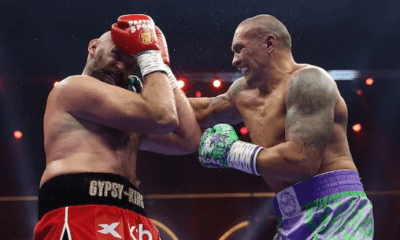
 Featured Articles2 weeks ago
Featured Articles2 weeks agoBoxing Notes and Nuggets from Thomas Hauser
-
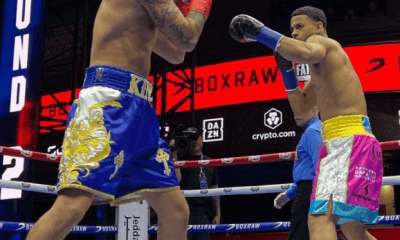
 Featured Articles4 weeks ago
Featured Articles4 weeks agoRolly Romero Upsets Ryan Garcia in the Finale of a Times Square Tripleheader
-
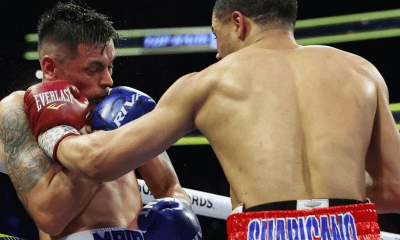
 Featured Articles4 weeks ago
Featured Articles4 weeks agoUndercard Results and Recaps from the Inoue-Cardenas Show in Las Vegas
-
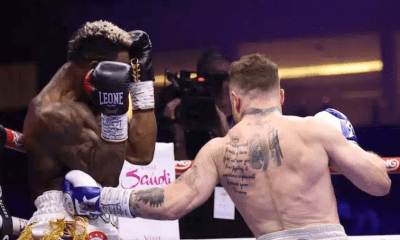
 Featured Articles4 weeks ago
Featured Articles4 weeks agoCanelo Alvarez Upends Dancing Machine William Scull in Saudi Arabia
-
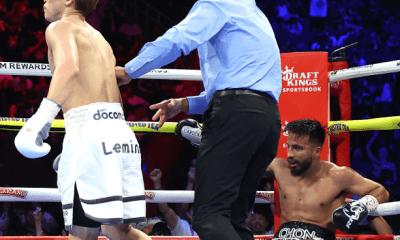
 Featured Articles4 weeks ago
Featured Articles4 weeks agoBombs Away in Las Vegas where Inoue and Espinoza Scored Smashing Triumphs
-
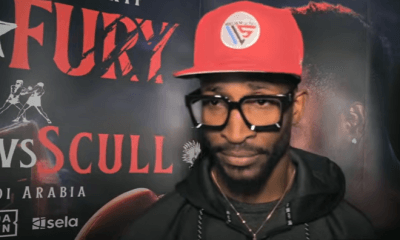
 Featured Articles4 weeks ago
Featured Articles4 weeks agoArne’s Almanac: The Good, the Bad, and the (Mostly) Ugly; a Weekend Boxing Recap and More
-
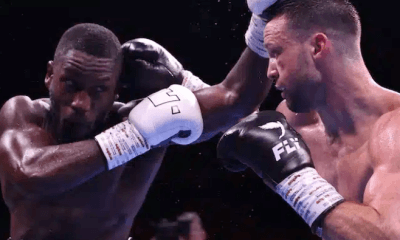
 Featured Articles1 week ago
Featured Articles1 week agoEkow Essuman Upsets Josh Taylor and Moses Itauma Blasts Out Mike Balogun in Glasgow



















